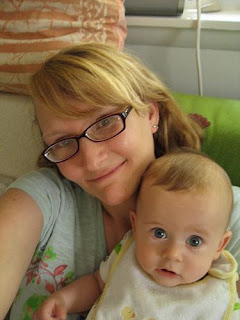by Kathy Gleason
 The general population often misunderstands veganism. Many people don't even know the difference between being vegetarian and vegan.
The general population often misunderstands veganism. Many people don't even know the difference between being vegetarian and vegan.In a nutshell, the difference is this: vegetarians generally eat animal products, such as eggs or milk and cheese, and just avoid meat and seafood. Vegans eat no animal products, subsisting on fruits and veggies and legumes and nuts.
This may sound limiting, but vegans often learn to be very creative in their food choices. Even dedicated vegans, however, may find themselves overwhelmed when their first children are born.
Not to fear. Vegan diet can meet all of your baby and child's nutritional needs, but only if it is done properly. It's actually far easier to raise a vegan baby than it may seem. It's important to discuss your child's diet with his or her pediatrician and get the specific guidelines for introducing solid foods. If possible, it's best if babies can be breastfed exclusively for at least six months, at which point it's appropriate to begin introducing solids. When that isn't a possibility, soy formulas work for many infants. You may have to contact individual companies if you have questions about whether a soy formula is completely vegan.
Rice cereal or quinoa flakes make a great first food for baby.However, make sure to read the label to ensure that there is no dried milk used in these cereals. When it's time for fruits and vegetables, there are jarred baby foods that are organic and fit the vegan bill. If you'd like to prepare your own baby food, it's not difficult.
Always introduce only one new food to your baby at a time, and wait a week until introducing another one, that way if there are any allergies or reactions, you will know which food they come from.
Good foods for vegan babies include mashed bananas, applesauce, pears, avocados, pears, pumpkin, pears, sweet potatoes, zucchini, and lentils. If you're worried about your baby not getting enough calories, ask the pediatrician if it's okay to add a bit of silken tofu to the baby food. For constipation, consider adding a bit of flax oil to baby food.
As you can see, feeding a baby a vegan diet isn't all that different from a traditional diet. It's not difficult to ensure that your baby gets enough calories as well as variety in his or her diet. Just make sure to run any new foods or liquids you plan to give to the baby past the doctor beforehand.
Don't worry about what people say to you about your parenting choices. It's entirely likely that well meaning family members and friends will try to dissuade you from raising your child on a vegan diet. As long as your child is healthy and thriving and his or her healthcare provider isn't concerned, just let the comments roll right off you.
Learn how to make your own baby food, homemade baby food is the logical choice for many. Homemade baby food is surprisingly easy to make. You will likely save a lot of money and know that baby is eating nutritious food.
Getting into the homemade baby food practice is fun, easy and gives baby the most nutritious start in life.
Here some recommended for you :











No comments:
Post a Comment